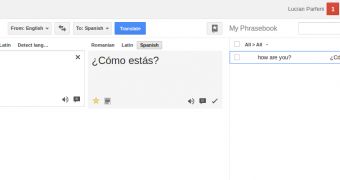There have been some signs that this was coming, but Google is making it official and introducing a Phrasebook for Google Translate.
"You might find yourself performing the same translation again and again, until you finally commit the translation to memory," Google explains.
"Phrasebook for Google Translate jumpstarts this slow learning process by allowing you to save the most useful phrases to you, for easy reference later on, exactly when you need them," it added.
"By revisiting the useful phrases in your Phrasebook from time to time, you can turn any brief translation into lasting knowledge," it said.
The idea is to make it easier for you to remember phrases you're going to use often or, at least, to have them available quickly when you need them.
You'll notice the new Phrasebook button on Google Translate, it opens a new section on the site, to the right of the two translation boxes. Once you start adding phrases, you'll see them listed there for convenience.
You can also filter them by language pair to make it easier to find the ones you need at a particular time.
Of course, the usefulness of all of this depends on how well Google Translate works.
Translate is good for understanding a piece of text in a foreign language, most of the time, but it's not good enough to generate phrases that are going to sound natural to native speakers.
That said, if you do find a proper translation, not necessarily via Google Translate, and want to make sure you don't forget it, the phrasebook may prove useful.
You'll notice that if you use the Phrasebook, you may be asked to help Google pick better translations for some phrases.
The idea seems to be that, if you use the phrasebook, you have some knowledge of both the languages you're using.
If you agree, you get a phrase and two translations. You have to pick the best one, unless you think they're both as good. The problem is that there's no way to suggest better translations or indicate that they are both wrong, making the tool fairly useless in most cases.

 14 DAY TRIAL //
14 DAY TRIAL //